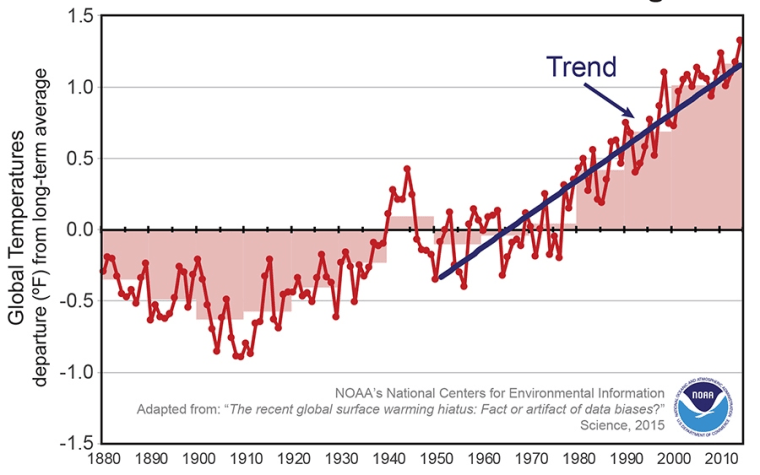Global warming has not stopped or even slowed in the past 18 years, according to a new federal study that rebuts doubters who've claimed that that heating trends have paused.
Scientists at the National Oceanic and Atmospheric Administration readjusted thousands of weather data points to account for different measuring techniques through the decades. Their calculations show that since 1998, the rate of warming is about the same as it has been since 1950: about two-tenths of a degree Fahrenheit (0.1 degrees Celsius) a decade.

The so-called hiatus has been touted by non-scientists who reject mainstream climate science. Those claims have resonated; two years ago, the U.N. Intergovernmental Panel on Climate Change felt the need to explain why the Earth was not heating up as expected, listing such reasons as volcanic eruptions, reduced solar radiation and the oceans absorbing more heat.
"The reality is that there is no hiatus," said Tom Karl, director of the National Centers for Environmental Information. He is the lead author of a study published online Thursday by the journal Science.
One key to claims of a hiatus is the start date: 1998. That year there was a big temperature spike; some of the following years were not as hot, though even hotter years followed in 2005, 2010 and 2014, according to NOAA, NASA and temperature records kept in England and Japan.
The study focuses on the ways in which ocean temperatures have been recorded. Generations ago, researchers measured the warmth of water that was taken aboard ships at various times of day. Today, the temperature are recorded by buoys at a standard time of day.
Karl said the buoy measurements are more accurate, but can't be compared directly to the ship measurements for a trend without making adjustments. So to come up with a trend using comparable numbers, NOAA increases the buoy temperatures a bit.
Related: Warming Pause? The Answer Is Blowin' Into the Ocean
A few years ago, NOAA made similar adjustments to make land temperatures more comparable decade-to-decade. But that caused some non-scientists who reject climate change to cry tampering. Several outside scientists contacted by The Associated Press said the previous adjustments, and the new adjustments, are sound.
John Christy of the University of Alabama at Huntsville, one of the minority of scientists who dispute the magnitude of global warming, questioned the newly published paper because satellite data show little recent warming. "You must conclude the data were adjusted to get this result" of no warming pause, Christy wrote in an email. "Were the adjustments proper? I don't know at this point."
The Science paper, "Possible Artifacts of Data Biases in the Recent Global Surface Warming Hiatus," is freely available online. In addition to Karl, the authors include Anthony Arguez, Boyin Huang, Jay Lawrimore, James McMahon, Matthew Menne, Thomas Peterson, Russel Vose and Huai-Min Zhang.